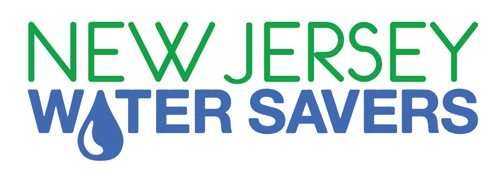New Jersey Water Savers ~
A Drinking Water Conservation Pilot Program for New Jersey
In 2007 the Rutgers Cooperative Extension Water Resources Program, along with our program partners, the New Jersey Department of Environmental Protection, Division of Water Resources and the United States Environmental Protection Agency, Region 2, began developing a drinking water conservation pilot program for New Jersey.
This water conservation pilot program for New Jersey began with the solicitation of municipalities. Out of forty applicants, five communities were chosen due to their specific water supply issues, as well as their demographics.
The five communities include Livingston Township in Essex County, the City of Rahway in Union County, Belmar Borough in Monmouth County, East Greenwich Township in Gloucester County, and Egg Harbor Township in Atlantic County.
The first year of the program consisted of working closely with the Environmental Commissions and local municipalities to survey the communities and recommend various programming that could potentially help yield significant water savings in the community. Once the recommendations were reviewed and approved by the respective communities, work began to implement the various programs.
Financial and/or in kind support for this program has been provided by a Pollution Prevention grant funded by the U.S. Environmental Protection Agency, Region 2 and a grant from the New Jersey Department of Environmental Protection, Division of Water Resources.
The Need for Water Conservation
With an average rainfall of 45 inches per year, New Jersey is often considered a “water rich” state. However, when considering that New Jersey is also the most densely populated state in the country, our current and future demands are likely to exceed the sustainable supply of our water resources. The average New Jersey resident uses 100 gallons of water per day, a number which in many cases increases dramatically during the summer months. In fact, in some cases, New Jersey communities that engage in outdoor irrigation increase their average water use by up to 85 gallons per day in the summer months.
Even in areas where water seems abundant, water conservation is important. In addition to saving money on utility bills, water conservation helps prevent water pollution in nearby lakes, rivers, and local watersheds, extends the life and reliability of septic systems, public and private infrastructure and prevents or postpones the need to fund and build expanded public works systems.
New Jersey’s water demands are quickly approaching the resource’s limits. Water will likely influence the future of New Jersey in the following ways:
- Natural environment
- Overall landscape
- Statewide development
- Local zoning
- State’s economy
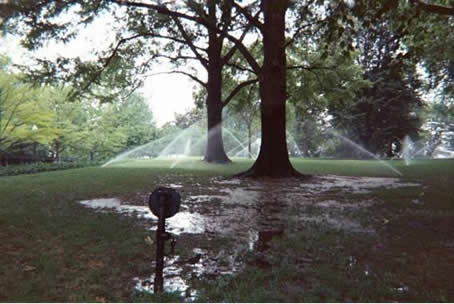
Photo Credit: Bob Dobson, Middletown Sprinkler Company,
The White House, Washington, DC
New Jersey Water Savers Partnership
New Jersey Water Savers is a partnership between the Rutgers Cooperative Extension Water Resources Program, the New Jersey Department of Environmental Protection, and the United States Environmental Protection Agency. This partnership was created to provide leadership to promote water conservation throughout New Jersey.
This partnership has resulted in conservation projects conducted in five pilot communities. The results of the projects have provided an excellent foundation for educational and outreach programs that can be delivered across New Jersey. The partners have developed and implemented programs that have been designed to encourage local stakeholders to change their behavior, ultimately saving water. These programs have the potential to save taxpayers capital expenditures over the long term by delaying or even eliminating the need to develop new or expanded water supply systems and wastewater treatment plants.

New Jersey Water Conservation Incentive Programs
The Rutgers Cooperative Extension Water Resources Program, in partnership with the New Jersey Department of Environmental Protection and the United States Environmental Protection Agency implemented three water conservation incentive programs as part New Jersey Water Savers. To learn more about these programs, click on the links below.
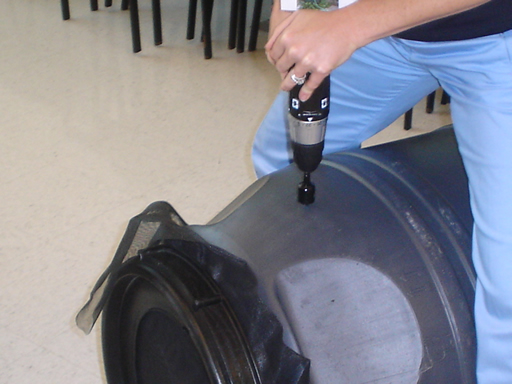
Photo Credit: Katie Barnett, NJDEP, Rahway Build Your Own Rain Barrel Program
Programs Encouraging Indoor and Outdoor Conservation
For the last three years, New Jersey Water Savers has worked on water conservation programs that blend education, indoor, and outdoor conservation. The purpose of these programs is to educate the public and decision makers through a combination of outreach efforts.
- Model Ordinance Development and Promotion
- Project WET
- Publicity Events
- Water Supply and Conservation Videos
- Video #1 - Water, a Matter of Importance
- Video #2 - Saving Water is Saving Money - Inside the Home! ~ coming soon!
- Video #3 - Saving Water is Saving Money - Outside the Home! ~ coming soon!
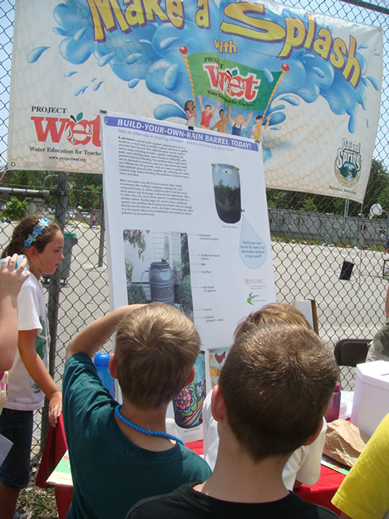
Photo Credit: Elaine Rossi-Griffin, Egg Harbor Township Make a Splash Festival,
promoting indoor and outdoor water conservation
In 1993 the Energy Policy Act established water conserving guidelines for all plumbing fixtures and appliances to be sold in the United States. Over time, this has helped reduce the overall amount of water used indoors in the typical American house. However, there are still many outdated fixtures and appliances contributing to the waste of New Jersey’s water resources.
The following projects have been developed and implemented to determine potential water savings and costs associated with updating public building and private residencies with water conserving technologies.
- Retrofits to Public Schools
- Home Built to EPA's WaterSense® New Home Specifications
- Rahway Housing Authority Meter Project
- Rahway Water Champions Project
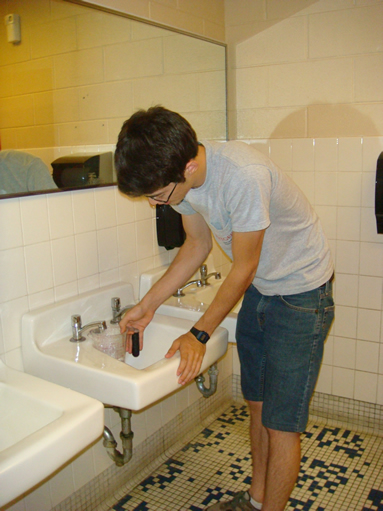
Photo Credit: Elaine Rossi-Griffin, Tolin Helsel conducting a water audit
at the Jeffrey Clark Elementary School
Outdoor Demonstration Projects
Increasing potable water use being consumed to irrigate lawns and landscapes is of increasing concern in New Jersey. This highly treated water, intended for drinking and potable uses, is literally being evaporated into the air thus placing an increasing stress on the State’s aquifers, streams, and reservoirs. New Jersey Water Savers identified and installed multiple demonstration garden sites and developed workshops specifically to educate residents about the true water needs of New Jersey plant life and how they can do their part to curtail outdoor water waste.
- Rain Garden and Naturalizing Retention Basins
- Smart Irrigation Controllers
- Irrigation Efficiency Study in Belmar
- Turf Management for a Healthier Lawn
~ Environmentally-Friendly Turf Care Website - Rainwater Harvesting System in East Greenwich Township
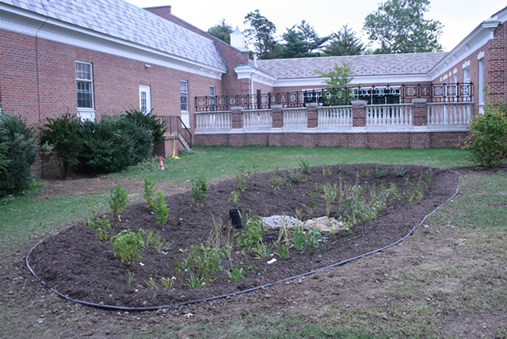
Photo Credit: Renee Resky, Livingston Twp.,
The Livingston Public Library Rain Garden
Marketing Water Conservation to Tourists of Belmar
Belmar is a coastal community surrounded by water on three sides and is a Jersey shore destination for many people that want to enjoy a relaxing summertime vacation. Similar to other beach towns in New Jersey, Belmar has a yearly population of approximately 6,000 residents and swells to 70,000 visitors annually. Despite having an average of 45 inches of rainfall annually, New Jersey is vulnerable to water supply shortages. The Belmar Commission, in partnership with New Jersey Water Savers, worked to find opportunities for water conservation education with the hope that visitors will conserve water while they stay and will bring this important message home.
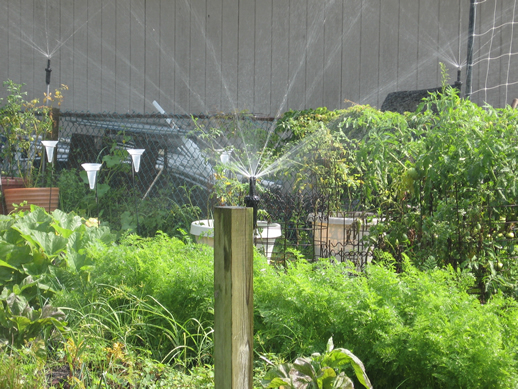
Photo Credit: Bob Dobson, Middletown Sprinkler Company,
The Magical Garden Efficiency Study in Belmar
During the fall of 2007, New Jersey Water Savers actively recruited municipalities to participate in the program. To help with recruitment efforts, a Municipal Application Form, Program Fact Sheet, and Press Release was developed and distributed at the League of Municipalities Conference in Atlantic City, NJ, NJDEP Office of Communications, and through the Association of New Jersey Environmental Commissions in October 2007. Municipality Applications were received through January. Over 35 applications were received. From the pool of applicants, five were selected:
Links to Partners and Resources
The following websites have additional water conservation tips and resources:
- Rutgers Cooperative Extension Water Resources Program
http://www.water.rutgers.edu - New Jersey Department of Environmental Protection
http://www.state.nj.us/dep/ - Water Sense - An EPA Partnership Program
http://www.epa.gov/watersense - County and Municipal Web Sites for the State of New Jersey
http://www.state.nj.us/nj/govinfo/county/localgov.html - New Jersey State League of Municipalities - Electronic Ordinance Library & Consultation Service
http://www.njslom.org/ordinance-library-intro.html
Pilot Communities:
- Belmar Borough
http://belmar.com/ - East Greenwich Township
http://www.eastgreenwichnj.com/ - Egg Harbor Township
http://www.ehtgov.org/ - Livingston Township
http://www.livingstonnj.org/ - City of Rahway
http://www.cityofrahway.com/home.htm
Corporate Sponsors:
- American Standard
http://www.americanstandard-us.com - W.A. Birdsall Plumbing & HVAC Supply
http://birdsallonline.com/
- New Jersey American Water
http://www.amwater.com/njaw
- United Water
http://www.unitedwater.com
